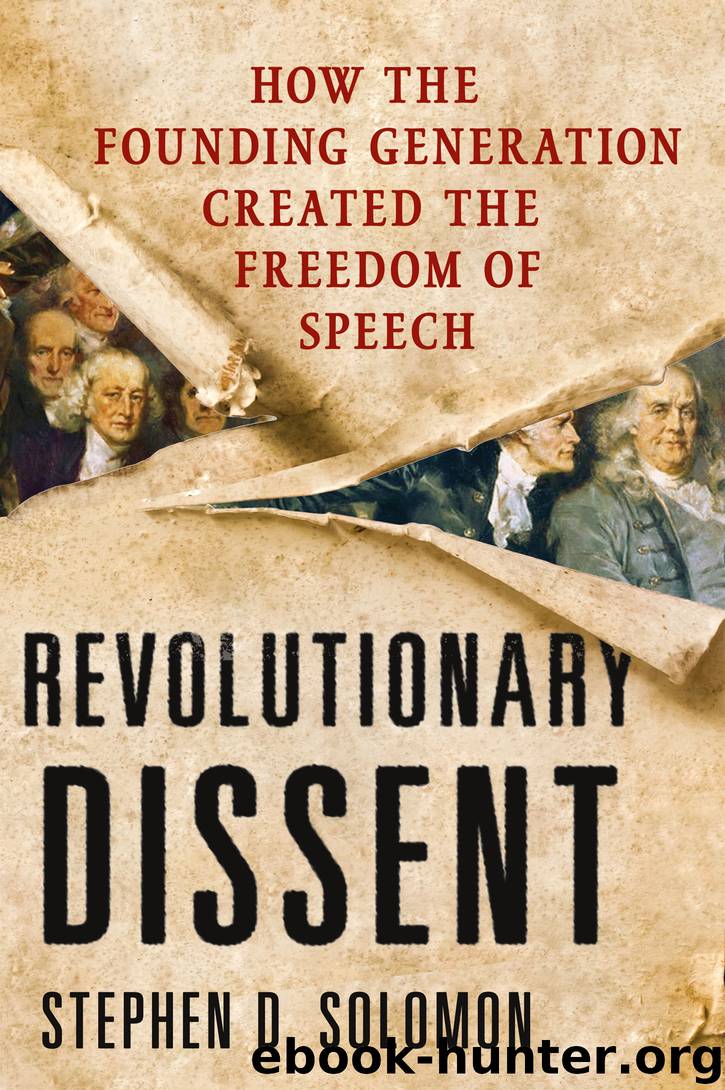Revolutionary Dissent by Stephen D. Solomon

Author:Stephen D. Solomon
Language: eng
Format: epub
Publisher: St. Martin's Press
Published: 2016-03-07T16:00:00+00:00
8
The Planter
After spending the summer of 1787 in Philadelphia, where he had presided over the drafting of the new Constitution, George Washington left for his estate at Mount Vernon.1 The bad roads made for an eventful trip home, for three days short of Mount Vernon his carriage and two horses fell into the Elk River as the bridge he was crossing collapsed. Befitting a man who had bested the most formidable military power on Earth, Washington was unhurt and unfazed by the rotten timbers, having dismounted from his carriage and walked ahead of it just before the bridge came down.2
Washington attended once again to the business of running his plantation and enjoyed his majestic views of the Potomac. But he was thinking about the challenge of steering his home state of Virginia to ratification of the Constitution, no easy matter given political divisions within the state. Two days after his arrival, Washington wrote a note to another distinguished Virginian, Patrick Henry, and enclosed a copy of the Constitution. He knew that Henry would be a key actor in the ratification convention in the state, and he feared for the worst.
Henry was an immensely popular politician who had served three consecutive one-year terms as the first governor of Virginia after independence, followed by another series of terms from 1784 to 1786. Henry had turned down an opportunity to serve in the Constitutional Convention. A strong advocate of states’ rights, he might have vehemently opposed the plan in Philadelphia to enhance the power of the national government.
Anticipating resistance from Henry, Washington suggested in his letter that the Constitution could be amended later. “I wish the Constitution which is offered had been made more perfect,” he wrote, “but I sincerely believe it is the best that could be obtained at this time—and as a constitutional door is opned for amendment hereafter—the adoption of it under present circumstances of the Union is in my opinion desirable.” Washington also expressed concern for the divisions in the country. “From a variety of concurring accounts it appears to me that the political concerns of this Country are, in a manner, suspended by a thread.”3
With its wealth, population, and respected leadership, Virginia was a key to ratification. Although ratification by nine states would put the Constitution into effect for them, the new nation would be severely weakened if it went forward missing any of the bigger states. Virginia looked to be a toss-up. Washington wrote to James Madison, who had played a leading role in drafting the Constitution, expressing some hope that Henry would prove to be supportive. Madison, serving in the Confederation Congress in New York, wrote back fully aware that Henry would exert enormous influence in the Virginia convention. “Much will depend on Mr. Henry, and I am glad to find by your letter that his favorable decision on the subject may yet be hoped for,” Madison wrote to Washington on October 18.4
The very next day, though, Henry replied to Washington that he would oppose ratification by Virginia.
Download
This site does not store any files on its server. We only index and link to content provided by other sites. Please contact the content providers to delete copyright contents if any and email us, we'll remove relevant links or contents immediately.
| African Americans | Civil War |
| Colonial Period | Immigrants |
| Revolution & Founding | State & Local |
Cat's cradle by Kurt Vonnegut(13856)
Pimp by Iceberg Slim(12922)
Underground: A Human History of the Worlds Beneath Our Feet by Will Hunt(11251)
4 3 2 1: A Novel by Paul Auster(11033)
The Radium Girls by Kate Moore(10901)
American History Stories, Volume III (Yesterday's Classics) by Pratt Mara L(4821)
Perfect Rhythm by Jae(4616)
Wiseguy by Nicholas Pileggi(4581)
The Fire Next Time by James Baldwin(4336)
Paper Towns by Green John(4163)
A Higher Loyalty: Truth, Lies, and Leadership by James Comey(4024)
Pale Blue Dot by Carl Sagan(3995)
The Mayflower and the Pilgrims' New World by Nathaniel Philbrick(3905)
The Doomsday Machine by Daniel Ellsberg(3725)
Too Much and Not the Mood by Durga Chew-Bose(3689)
Killers of the Flower Moon: The Osage Murders and the Birth of the FBI by David Grann(3604)
The Borden Murders by Sarah Miller(3581)
The Sympathizer by Viet Thanh Nguyen(3466)
Sticky Fingers by Joe Hagan(3449)
